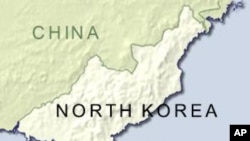North Korea has taken dramatic steps in recent weeks to redistribute wealth, and to destroy the earnings of those engaging in what Pyongyang views as illegal trading. North Korea scholars say the steps are aimed at reining in a market that could threaten the country's rulers even as it sustains the population.
The Seoul Buddhist charity group "Good Friends" says North Korea's government appears to be suspending or closing several wholesale markets around the country.
Revaluation
The moves follow a series of steps one newspaper linked to North Korea reported will "further strengthen the principle and order of socialist economic management." Regional experts say the leadership is cracking down on market traders it thinks have become too powerful.
On November 30, North Korea's government suddenly re-valued its currency, ordering citizens to exchange old won notes for new bills, at an exchange rate of 100 to one. It allowed each person to exchange just 100,000 won - the equivalent of around $30. Pyongyang has since banned the use of foreign currency such as U.S. dollars, or Chinese yuan.
The changes effectively destroyed the wealth of those who had piled up won by trading in makeshift markets. Many North Koreans keep their money at home because they either cannot access or do not trust the country's banks.
Reactions
Ha Tae-kyoung is the president of Open Radio for North Korea, which, like VOA, broadcasts news into the North. He says sources inside North Korea report frustration at the revaluation.
"They were all upset about it, so angry," he said. "So some of them throw away their bills in the river. And some of them burned it away."
North Korean currency bears the image of the country's revered first leader, Kim Il Sung. Defectors say defacing any image of the Kim family, even accidentally, can lead to a labor camp sentence.
"Although they know that is a very serious political crime, they did that," said Ha. "That means the people's reactions are so upset about it."
Decades of economic mismanagement caused a famine in North Korea in the 1990's. Hundreds of thousands are presumed to have died. The dire conditions gave rise to grassroots markets in which people trade for basic food staples. In 2002, Pyongyang allowed limited markets.
Reporession and confusion
Now, says Marcus Noland, of the Peterson Institute for International Economics in Washington, Pyongyang may feel some have benefited from the markets a bit too much.
"Clearly part of the motivation for this was to really strike a blow at the merchant class that has arisen over the last 15 years or so," he said.
Noland describes Pyongyang's moves as the exact opposite of China's economic reforms that began in the 1970s; getting rich, far from being glorious, makes North Koreans a target for punishment. Noland says market traders have suspended their activities in confusion over the new policies.
"They've pulled supply back off the market, because they don't know if they'll be arrested if they try to sell things, they don't know under what prices, even what currencies they can use," said Norland. "So, as a consequence, at least in the short run, we've seen a huge spike in the price of staple items such as rice and corn."
There are also reports the North's new currency has plunged dramatically against the dollar and the yuan on black markets.
"Positive development"
But Kim Keun-sik, North Korea scholar at Seoul's Kyungnam University, says the reforms also have had some success.
He says those who made huge profits in the market are the losers in the reforms. However, salaried workers closely connected to the government can see the reforms as a positive development.
That is because some government workers are receiving the same nominal salaries as before the 100-to-1 devaluation, effectively raising their pay by a factor of 100.
Kim says he thinks North Korean leader Kim Jong Il and his apparatus remain strong enough to keep the market in check. He says the North Korean leader would not have implemented the reforms if he thought there would be serious resistance.
Noland, of the Peterson Institute, agrees. He says heavy repression, combined with a lack of civil mechanisms for airing grievances, will probably ensure political stability for now.
However, Noland warns that could change if Pyongyang tries to enforce the ban on owning foreign currency.
"It's the elites that deal in foreign currency, indeed, parts of the military and security services," he said. "And if the government literally tried to take their dollars or yuan away, that's the sort of thing that could actually lead to political instability."
Noland says most typical North Korean families now depend on markets for their food, so any intervention by the government has immediate repercussions on public welfare. And some aid agencies have warned the country's food supply has fallen short in the past year.




